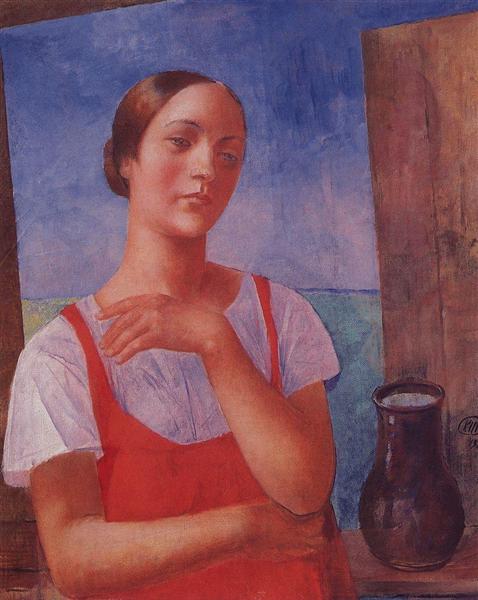Description
The work "The Sarafan Girl" of 1928, signed by the Russian painter Kuzma Petrov-Vodkin, is a masterful representation that illustrates with delicacy and precision the daily life and popular culture of the Russia of the early twentieth century. In this work, Petrov-Vodkin presents us to a young woman dressed in a Sarafan, the traditional Russian women's clothing, immersing ourselves in the atmosphere of a specific time and place.
The painting stands out for its balanced composition, focused on the figure of the girl holding a vessel. The red Sarafan that has contrasts vividly with the most off environment, mainly dominated by smooth and soft blue tones. This use of color not only intensifies the central figure but also evokes a sense of tranquility and simplicity. It is no accident that the artist opted for such a insightful chromatic scheme; Petrov-Vodkin was known for his ability to use color symbolically and emotionally.
The background, which although austere, reveals itself significant. The arrangement of the elements suggests a modest interior space, probably a kitchen or work area of a peasant house, being the vessels and the curtains that in addition to being useful, contribute to the setting. Through the window, we can glimpse a serene sky that contributes to this feeling of calm and daily life, an aspect that Petrov-Vodkin captured with mastery.
One of the most prominent aspects of this piece is the serene but introspective look of the young woman. His expression seems to invite the viewer to a silent and personal reflection. Petrov-Vodkin, known for his in-depth studies of human expressions, achieves in this work a reliable capture of internal emotion, something that resonated with merit in the artistic environment of his time.
The technique used by Petrov-Vodkin in this work denotes a clear influence of their studies in Paris and its adoption of certain elements of symbolist art. The firmness and clarity of the contours, together with the solidity of the forms, are constant characteristics in the artist's work. This solid academic approach allowed him to blur the lines between the earthly and the spiritual, an obvious achievement in "the Sarafan girl."
Petrov-Vodkin not only painted with the intention of representing visual reality, but also to explore deeper issues about human existence and cultural identity. In this sense, "the Sarafan girl" is a reflection of his interest in capturing the essence of humanity through Russian culture. His characters, often extracted from rural life, are presented with a dignity and sincerity that transcend the merely decorative to invite us to a deeper contemplation of their individual realities.
In the historical context, the painting was made in a period of turbulence and significant change in the Soviet Union. It was a time when artists were looking for new ways to express their experiences and observations of the vast social and political panorama. Petrov-Vodkin approach towards peasant life can be seen as an artistic response to these changes, a way of preserving and honoring cultural traditions in an accelerated modernization time.
In short, "the Sarafan girl" encapsulates the ability of Kuzma Petrov-Vodkin to amalgamate the simplicity of everyday life with symbolic depths that invite reflection. Through its precise composition, emotional and detailed color palette representation of the human figure, this work remains a enduring testimony of praxis and the artistic vision of one of the most notable masters of Russian art of the twentieth century.
KUADROS ©, a famous paint on your wall.
Hand-made oil painting reproductions, with the quality of professional artists and the distinctive seal of KUADROS ©.
Art reproduction service with satisfaction guarantee. If you are not completely satisfied with the replica of your painting, we refund your money 100%.

